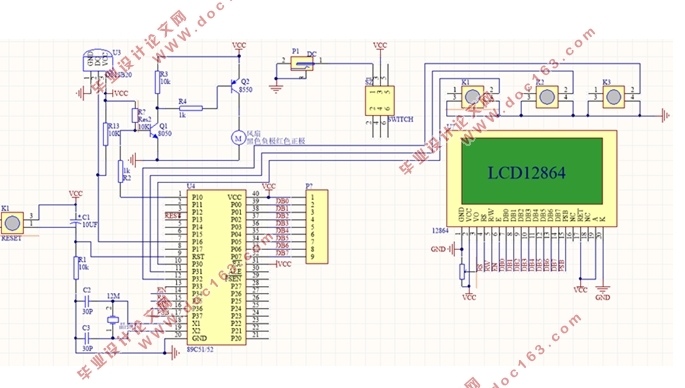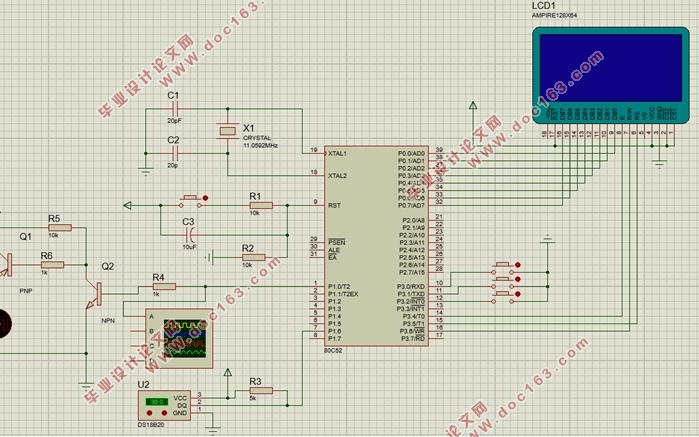基于单片机的温控风扇的设计(附电路图)

1.无需注册登录,支付后按照提示操作即可获取该资料.
2.资料以网页介绍的为准,下载后不会有水印.资料仅供学习参考之用.
密 惠 保
基于单片机的温控风扇的设计(附电路图)(论文9500字)
摘要:现代社会,无论是在工业生产还是在电子设备的日常使用中,总是会产生多余的热量。散热一直是生产或者电子设备设计中所需要考虑的一个重要问题。而风扇散热作为一种简单、直接、便捷、有效的方式被广泛地应用。而如今既能有效散热又能达到节能效果的温控风扇应运而生。本文设计了一种根据温度控制的风扇调速系统。该系统基于STC89C52单片机,采用DS18B20温度传感器,根据采集到的温度与键盘设定的温度进行比较,单片机产生PWM波控制风扇电机的自动开启或停止,同时可以根据当前环境温度的变化来使风扇的电机无级调速,并通过LCD12864液晶显示屏来显示当前的环境温度、温度上下限和当前风扇转速。
关键词:单片机、PID算法,脉冲宽度调制
Design of temperature controlled fan based on single chip microcomputer
Abstract:Modern society, whether in industrial production or in the daily use of electronic equipment, will always produce excess heat. Heat dissipation has always been an important issue to be considered in the design of production or electronic equipment. And fan heat dissipation is widely used as a simple, direct, convenient and effective way. And now can effectively dissipate heat and can achieve energy-saving effect of the temperature control fan came into being. In this paper, a fan speed regulation system based on temperature control is designed. The system is based on STC89C52 single-chip microcomputer, the use of DS18B20 temperature sensor, according to the collected temperature and keyboard set temperature comparison, single-chip microcomputer generated PWM Wave control fan Motor automatic opening or stop, at the same time, according to the current environmental temperature changes to make the fan motor stepless speed regulation,The current ambient temperature, the upper and lower limits of temperature and the current fan speed are displayed through the LCD12864 LCD display. [资料来源:http://think58.com]
Key words: single-chip microcomputer, PID,PWM
[资料来源:http://THINK58.com]


目 录
一、引言 6
1.1背景 6
1.2国内外现状 6
1.3研究内容 7
二、方案设计 7
2.1 系统整体设计 7
2.2方案论证 8
2.2.1 温度传感器的选择 8
2.2.2 控制核心的选择 8
2.2.3 显示元件的选择 8
2.2.4 调速方式的选择 8
三、硬件设计 9
3.1系统器件简介 9
3.1.1 DS18B20数字温度传感器的概述 9
3.1.2 AT89C52单片机简介 10
3.1.4 LCD12864液晶显示屏简介 10
3.2 各部分电路设计 11
3.2.1 开关复位与晶振电路 13
3.2.2 独立键盘连接电路 13
3.2.3 液晶屏显示电路 13
3.2.4 温度采集电路 13
3.2.5 风扇电机驱动与调速电路 13
四、PID控制 13
4.1PID控制原理 13
4.2PID控制算法的实现 14
4.3PWM波占空比的计算 15
五、软件设计 15
5.1 程序设置 15
5.2由Keil C51完成程序编写 16
5.3 用Proteus进行仿真 16
5.3.1 Proteus简介 16
5.3.2 基于Proteus的仿真 16
六、系统调试 18
6.1 软件调试 18
6.1.1 按键显示部分的调试 18
6.1.2 传感器DS18B20温度采集部分调试 18 [资料来源:http://think58.com]
6.1.3 电机调速部分的电路调试 19
6.2 硬件调试 20
6.2.1 按键部分的调试 21
6.2.2显示部分的调试 24
6.2.3 传感器DS18B20温度采集部分与电机调速电路部分的调试 24
七、结论 27
参考文献: 28
致 谢 29
